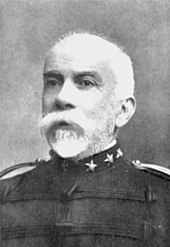Joaquim Pimenta de Castro
Joaquim Pereira Pimenta de Castro (born November 5, 1846 in Monção , † May 14, 1918 in Lisbon ) was a Portuguese general and politician . In 1915 he was briefly Prime Minister and Foreign Minister of Portugal .
Life
Pimenta de Castro studied mathematics at the University of Coimbra and started an officer career in the Portuguese army. In 1908 he became commander of the third military district in the north of the country ( Porto area ). After the republic was proclaimed in 1910, he joined the first government under the new constitution in 1911 under João Chagas as Minister of War . During his time as minister of war there was a first uprising of monarchist troops in the north of the country, led by Captain de Paiva Couceiro . Castro was accused of not doing enough to prepare for this uprising, so he eventually had to resign.
1915 was a year of crisis for the First Republic . In particular, the discussion about whether Portugal should join the First World War on the side of the Entente powers heated the minds. Prime Minister Victor Hugo de Azevedo Coutinho of the Democratic Party had won the parliamentary elections in late 1914, but was generally viewed as weak (" the wretched of Victor Hugo "), with the leader of the Democrats, Afonso Costa , standing behind him as the decisive politician . There were also allegations that the Democrats had distorted the results of the 1914 elections. The militant anti-clericalism was particularly criticized by sections of the Democratic Party.
The opponents of the Democrats, or rather of Afonso Costa, who in the meantime was their undisputed leader after his internal party opponents had left the party in 1912, now united to break what they saw as the party's sole rule. President Manuel de Arriaga , who, although he himself came from the Democratic Party, was now involved in a power struggle against Afonso Costa, was one of these opponents .
Castro became one of the leaders of the conservative part of the army leadership that was in opposition to Afonso Costa. On January 25, 1915, he led a military coup that dissolved the newly elected parliament. Three days later, on January 28, President de Arriage appointed him the new head of government. He formed a government that consisted primarily of the military.
The Castro government relied on two smaller parties that split off from the Democrats in 1912, the evolutionists and the unionists , and especially the conservative section of the officers' corps. Castro ruled with decrees countersigned by the president. Since his government relied particularly on the strength of the military, it was also referred to by its opponents as the "dictatorship of the swords" ( Ditadura das Espadas ). The policies carried out by the Castro government stood in sharp contrast to the policies of its previous governments and the ideas of Afonso Costa. Negotiations with the Entente Powers about Portugal's entry into the First World War were ended, as was the anti-clerical policy, which had meanwhile degenerated into regular church persecution.
On May 14, 1915, the Democrats finally struck back. There was another military coup, this time carried by officers close to the Democratic Party. This putsch ended the “dictatorship of swords” and a military junta temporarily took power until the parliamentary form of government was restored. President de Arriaga, who had supported the Castro government, was also forced to resign a few days later (on May 26).
family
The son of Joaquim Pimenta de Castro was Gonçalo Pereira Pimenta de Castro , governor of Portuguese Timor .
See also
Web links
- Germany declared war on Portugal (March 9, 1916) with comments on the de Castro government and the political situation at the time
Individual evidence
- ↑ Monika Schlicher: Portugal in East Timor. A critical study of the Portuguese colonial history in East Timor from 1850 to 1912 (= Abera Network Asia-Pacific 4). Abera, Hamburg 1996, ISBN 3-931567-08-7 . At the same time: Heidelberg, Univ., Diss., 1994.
| predecessor | Office | successor |
|---|---|---|
| Victor Hugo de Azevedo Coutinho |
Prime Minister of Portugal 1915 |
Constitutional junta: José Norton de Matos António Maria da Silva José de Freitas Ribeiro Alfredo de Sá Cardoso Álvaro de Castro |
| personal data | |
|---|---|
| SURNAME | Pimenta de Castro, Joaquim |
| ALTERNATIVE NAMES | Castro, Joaquim Pereira Pimenta de (full name) |
| BRIEF DESCRIPTION | Portuguese general and politician |
| DATE OF BIRTH | November 5, 1846 |
| PLACE OF BIRTH | Monção , Portugal |
| DATE OF DEATH | May 14, 1918 |
| Place of death | Lisbon , Portugal |
